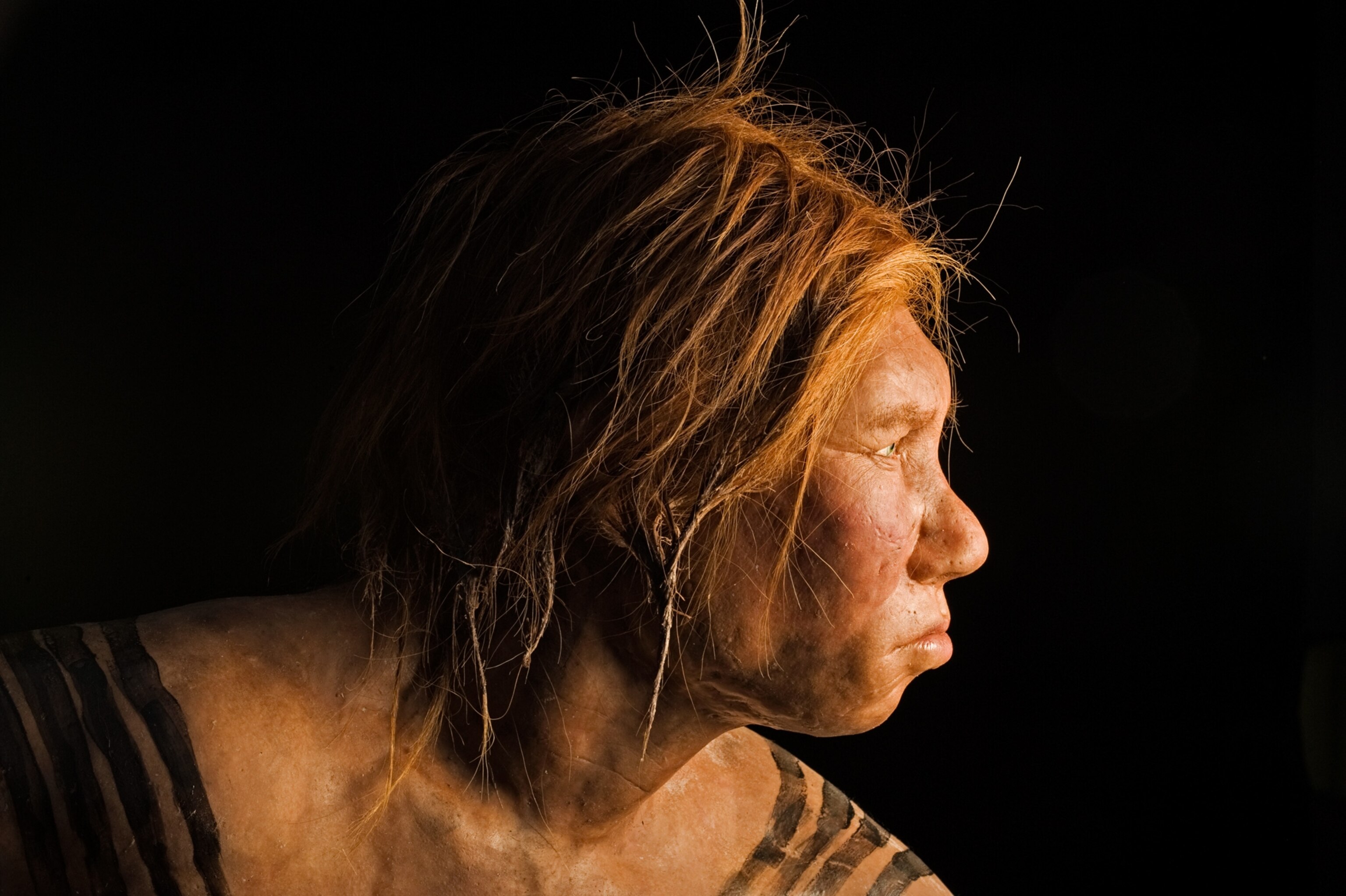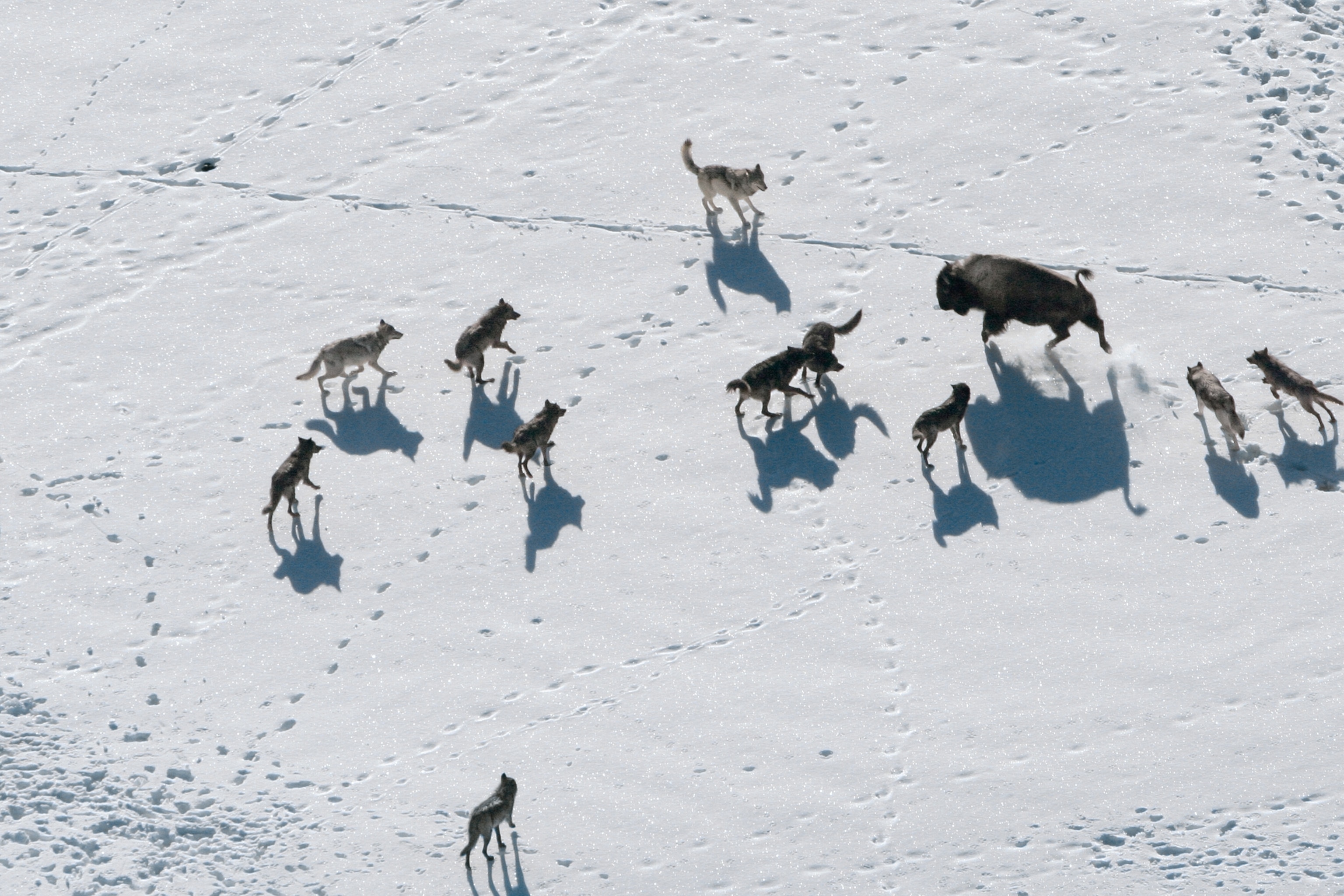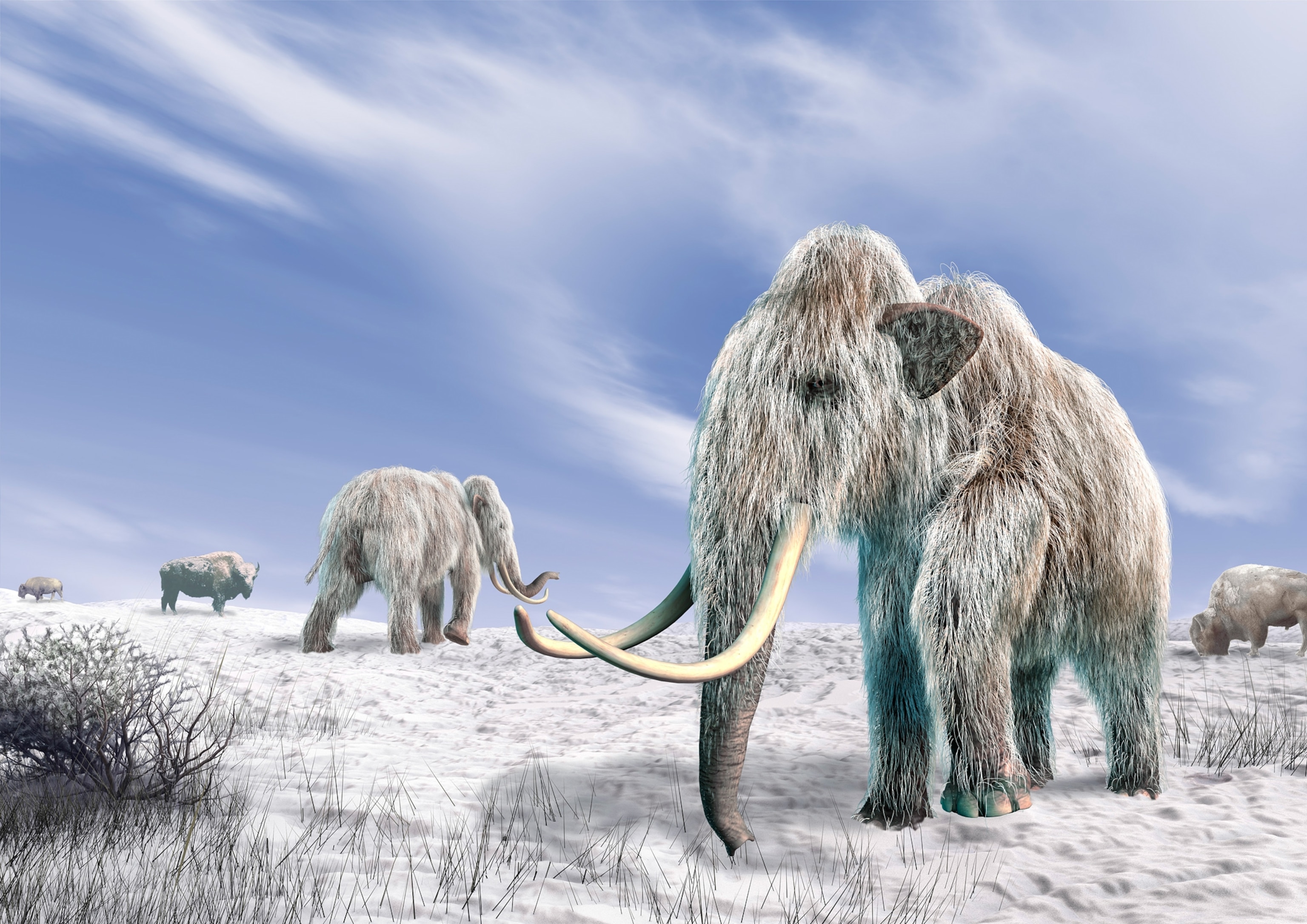
Did Dog-Human Alliance Drive Out the Neanderthals?
With the help of wolf dogs, early humans out-hunted—and outlasted—Neanderthals.
In popular culture, they're often portrayed like members of a heavy-metal band: fur clad, shaggy haired, ape-like. But in most ways they were like you and me. They used fire and made tools, lived in social groups, and loved red meat.
So why did the Neanderthals disappear? The traditional wisdom has been that climate change did them in, possibly triggered by the super-eruption of the Campi Flegrei volcano, near Naples, which sent already-cold Ice Age temperatures plummeting.

In her new book, The Invaders: How Humans and Their Dogs Drove Neanderthals to Extinction, Pat Shipman, retired adjunct professor of anthropology at Pennsylvania State University, sets out a groundbreaking new argument.
Talking from her home in North Carolina, she explains how reading about invasive species while holidaying on a Caribbean island inspired her, why more accurate carbon-dating methods have revised the timeline for Neanderthal extinction, and how the discovery of "wolf dog" remains at woolly mammoth sites in Central and Eastern Europe may hold the key to understanding why humans went on to build the Sistine chapel and send a robot to Mars while Neanderthals became a footnote in popular culture.
My wife sometimes calls me a Neanderthal. I'm a redhead and can be a bit brutish. Could I have the Neanderthal genome?
[Laughs] You could have some of it. But I very seriously doubt you'll have all of it. The degree of interbreeding between Neanderthals and modern humans was probably very slight. I've seen two calculations of how many cases of interbreeding would give us the kinds of levels most of us outside Africa carry, which is roughly one to 4 percent of the genome. It's approximately 50 to 80 [interbreeding events]—so that's not very many.
Neanderthals have had a pretty bad press. Tell us about them and why they're called Neanderthals.
The name actually comes from the Neander Valley or tal, near Dusseldorf, in Germany. What's deliciously ironic is that neander also means "new man." So it's the Valley of the New Man in which the original fossils were found.
And of course it was an utterly new man to everyone's eyes because no previous fossils had been found that were so closely related to humans but not human. So Neanderthals captured the public imagination and worked their way into numerous bad movies, cartoons, and songs.
Most experts ascribe the disappearance of Neanderthals above all to climate change. According to you, they're all wrong.
I wouldn't say climate had absolutely nothing to do with it. The climate, particularly in the parts of the world inhabited by Neanderthals and early humans at the time of the extinction, was unstable. And that produced changes in the habitats, in forests, plants, and animals.
But what we don't get is a very convincing linkage between climates and the extinction events. This is partly due to some wonderful advances in radiocarbon dating that we can thank the Oxford [University] dating lab for. They've worked out ways to decontaminate samples and ultrafilter them, so that by the time you've processed the sample, you've removed the contamination.
One of the examples cited by Tom Higham, the deputy director of the Oxford lab, is that if you have a 50,000-year-old bone, and it's contaminated with only one percent of modern carbon, which might seem pretty good, then the bone would appear to be 37,000 years old. That's a huge misdating.
And until many sites were re-dated with this new modern technique, it appeared Neanderthals were retreating farther and farther south toward the Mediterranean as the climate got colder, harsher, and drier. That has now been called into question because the dates from the southern sites, on which this hypothesis was based, are inaccurate.
The book begins with your eureka moment far from Neanderthal territory, on the Caribbean island of Little Cayman. Put us inside that moment.
My husband and I are very fortunate to own a small house on Little Cayman, an island west of Jamaica that's only one mile by ten, surrounded by wonderful tropical reefs with a high diversity of fishes and mollusks.
Some years ago, lionfish began invading the Caribbean and turned up on Little Cayman. Lionfish are very beautiful fish, much favored by the aquarium trade. But they come from the Indo-Pacific and have no business being in the Caribbean. They also reproduce at a phenomenal rate and eat everything they come across. So for an island where having beautiful reefs and pristine ecosystems was important, this was a disaster.
In the struggles to keep their numbers down, there has been a lot of work on invasion biology: the study of invasive species. Because I was trying to understand the lionfish phenomenon, I began reading about invasion biology and suddenly realized—Aha! This is what went on with modern humans and Neanderthals.
Neanderthals had been in Europe and into Asia for a couple of hundred thousand years before humans moved out of Africa into their home territory. The question has always been: Here are these two species, us and Neanderthals, which are closely related. We both made tools, had fire, were social and good hunters.
So how come one survived and the other didn't? Especially as the one that was the outsider survived, when you'd think the one that had been there for hundreds of thousands of years would know the terrain and the animals and how to survive.
The key to your theory about the extinction of the Neanderthals is the domestication of wolf dogs by humans. Can you unpack that idea for us a little bit?
First of all I want to say that when I use the term wolf dog, I don't mean a hybrid between a wolf and a modern dog. It's not clear if it's appropriate to call these things wolves or dogs. They're not modern dogs, and they're not modern wolves. They're not ancient wolves, either. They're a distinctive group. Forty individual specimens, at a number of different sites, have been identified as what I'm calling wolf dogs.

They're large, have big teeth and all those predatory, dog/wolf characteristics. You have to assume from the anatomy that they could track very well from the scent of an animal. They were built to be fast running, as wolves and most dogs are. Humans don't run terribly fast. We have a crappy sense of smell. We do cooperate with each other, which is helpful, and we had long-distance weapons, like spears and bows and arrows.
Neanderthals seem to have specialized in stabbing an animal at close quarters with handheld weapons and wrestling it down. We had weapons we could launch from a distance, which is a very big advantage. There's a lot less risk of personal injury.
Add into that mix the doggy traits of being able to run for hours much faster than we can, track an animal by its scent, then with a group of other wolf dogs surround the animal and hold it in place while you tire it out. The advantage for wolf dogs is that humans can come in and kill from a distance. The wolf dogs don't have to go and kill this thing with their teeth, thereby lowering the risk of injury and death from very large animals like mammoths. For humans, it meant you could find the animals a lot quicker and kill them more efficiently. More food, less risk, faster.
A lot of the new evidence from your claims came from an archaeological site in Předmostí, in the Czech Republic. Describe this place and how these finds revolutionized our understanding of Neanderthals.
Předmostí is one of a series of archaeological sites in Central and Eastern Europe. They're really weird sites because they're full of dead mammals. Before modern humans came into Eurasia, there was little evidence that Neanderthals were killing mammoths on a regular basis. They're huge! Attacking them with handheld weapons was probably too intimidating, unless you came across a baby mammoth.
But once modern humans arrive on the scene, you start finding these sites with dozens and sometimes hundreds of dead mammoths. At some, the bones are so concentrated that if the mammoths were alive they couldn't stand in the territory where their bones are.

These mammoth megasites, as they became known, contain an outrageous amount of mammoths. So what's changed that is going to enable modern humans to kill all these animals? Neanderthals couldn't, and they weren't inept. Distance weapons of the kind that humans had might have been helpful, but you had to track the darn thing as it died.
And that's where wolf dogs come in, because wolf dogs are found with lots of mammoth bones. Some of these sites even have beautiful tent-shaped huts made out of mammoth bone. This suggests people were there for a long time. They were living there and building these settlements where the animals died.
You don't carry around a dead mammoth. It's very difficult, and chopping it up and dragging it somewhere is a long and dangerous process because scavengers will start coming in, and there were very formidable carnivores around. There were wolves and cave lions, which were bigger than lions today. There were cave hyenas, a saber-toothed cat, and cave bears.
Hanging around a dead carcass while you cut it up is a really dangerous place to be. There would be a lot of confrontation going on over the carcasses, and humans would certainly have lost a fair number of those confrontations—unless they had a new way to guard the carcass. Then they could risk living there. And that is the wolf dogs.

Tell us now about the Jagger principle.
[Laughs] The Jagger principle is, "You can't always get what you want, but sometimes you find you get what you need." Life may not be perfect, life may not be simple, but with a little luck and ingenuity you may get what you need. I regard that as a very important ecological principle.
Modern humans clearly changed something about the way they were hunting, and it was something crucial. But Neanderthals didn't change. They continued to do things in the same old Neanderthal way as life got hard and times cold. They continued to hunt the same animals with the same tools in the same way. And that lack of adaptability may have been a telling failure as these new invaders moved in. If you then add in wolf dogs, Neanderthals were at a terrific disadvantage.
Last question, Pat. You cite Walt Kelly, the creator of the comic strip "Pogo"—"We've met the enemy. And he is us!" How are human beings their own worst enemy?
Because we're so invasive. Because we've continued to invade new continents and new habitats, accompanied by our dogs, altering, tipping, and changing the ecosystems in virtually any place in the world you can think of, with the possible exception of submarine habitats and Antarctica.
We're everywhere. And every place we go, we're an invasive predator. And we're really good at it! So, we're wiping out many valuable species and decreasing the biodiversity of the world by carrying "hitchhikers" like lionfish and killer bees and kudzu, which do their own damage to ecosystems.
You could say that the best ecological move for all the organisms alive today might be: killing off all humans. War never goes away, but none of us wants to vote for killing off all humans. There needs to be some kind of compromise where we can keep ecosystems functioning and intact and save the many beautiful, useful, and amazing creatures that live in the world with us. But it's a hard thing to do. And as our populations increase, it's going to get even harder.
Simon Worrall curates Book Talk. Follow him on Twitter or at simonworrallauthor.com.